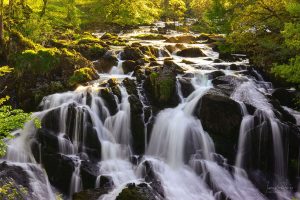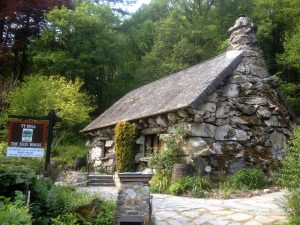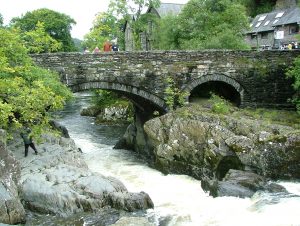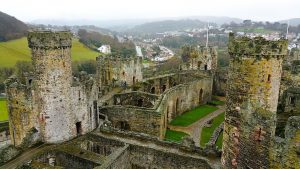
One of the reasons I thought that my wife Linda and I, along with our trusty Westie Kelty, should travel to Wales was for me to overcome a deep-seated grudge, an outright prejudice some might say, that I had against the Welsh.
However, before you judge me harshly, let me explain a few more details; as a young man (well, as someone in their late thirties) I was travelling about Wales, somewhere near Merthyr Tydfil or Pontypridd, when I stopped in one late afternoon for a pint of bitter at a pub in a small town. I was alone and looking every bit the outsider. I received dark looks from working men who had obviously just finished an honest day’s manual labour, I would guess, and in walks this foreigner (me) without a care in the world.
I sat at the bar and absorbed the scowls of working men with a certain amount of grace I believe and ordered my pint. I handed the barkeep a twenty pounder and he promptly handed back several of those weighty little pound coins. The price of a beverage to me that day seemed a bit steep here in whatever the town was. So, I reminded the man behind the bar that I had handed him a twenty, not a fiver or a ten. He grunted and I think so did a few of the other regulars not trying to mind their own business that afternoon. The man grudgingly opened the till again and slapped some appropriate bills with those funny pictures of the queen before me.
As I drank my bitter, feeling a bit bitter myself, I decided then and there that here was possibly the most unfriendly pub I had ever had the displeasure to drink in. Perhaps it was the most unfriendly pub in all the U.K., perhaps the Western World.

After that, even though I knew Wales to have some exquisite surfing beaches, dramatic mountains and lively culture, I couldn’t shake the feeling that I had received that unwelcoming day.
But now, as a man in his sixties, it was time to bury the hatchet and forget about old grudges.
Fittingly, perhaps, the skies were clear, and it was a fine day as we drove on to Llangollen through a green valley that has untarnished by slate or coal strip mining as far as the eye could see.
Between Llangollen and Glyndyfrdwy, however, not far from Horseshoe Falls, we hit more traffic on the highway. In fact, we came to a complete halt. After a twenty-minute wait, we were allowed to move forward and discovered that in the opposing lane of traffic was a monstrous size truck towing a mammoth blade of a wind generator that was at least four car lengths long. The truck was dead stopped. We’d seen wind generators generously distributed throughout the U.K. and, to me they were always symbolic of how far this nation and much of Europe had come since the energy crises of the 1970s and 1980s. Such change, though, comes at a price…and today, I supposed those late for an appointment due to the construction of environmentally-friendly energy sources would be cursing those goody-two-shoe environmentalists who were mucking up Welsh traffic flow with their damn wind machine parts.
Soon, however, we were past the truck and on our way, but for those coming from the other direction, the drivers were stuck in a traffic snarl that was at least five miles long. Maybe it is one of those disreputable North American traits but passing those other poor sods who were going to be stuck for a really long time and not knowing even why they were stopped, I felt a small bubble of happiness burgeoning in me. I daresay I am not proud of the feeling, but part of my brain produced the simple adolescent equation: they were stuck in traffic and I was not. How lucky is that?
A quick glance at our map assured me that there was probably not another easy way through this valley and, besides, there was no place to turn around on the narrow road. Those Welsh drivers were good and screwed if they were hoping to get home on time for their Welsh rarebit lunch. This seemingly insignificant event strangely lifted my spirits enough so that I had stopped worrying about my daughter Pamela and the soon-to-be twins.
Along the way we passed a place called Ewe-phoria Agri-theatre and Sheep Dog Centre although it didn’t look to be open. According to Britevents, the place “details the life and work of the shepherd on a traditional Welsh farm. The Agri-Theatre has unusual living displays of sheep with accompanying lectures on their history and breed, while outside sheepdog handlers put their dogs through their paces.” The BBC once declared Ewe-phoria one of the top U.K. Easter destinations, coming in at number thirty-eight just ahead of the Star Wars Museum.
I made a mental note to possibly stop there on our way back to England if we happened to be in the mood for unusual displays of sheep, but for now we kept going and, instead, stopped for a much needed break at in Pentrefoelas. Dayoutwiththekids.co.uk claims there are 155 “things to do” with kids in this town but there isn’t really. However, there is a little grassy park by a chattering brook with a cool arched stone bridge. There are wood carvings here and plaques with stories about the “Fair Folk” of Welsh legend.

Apparently, long ago, these mystical creatures appeared and disappeared on a regular basis and occasionally became intimately involved with the locals.
One story, recounted by author zteve t evans (zteve must really hate capital letters), tells of a young shepherd from Pentrefoelas who was staring at a peat stack one misty morning only to discover a beautiful girl standing there. It looked like she needed help and he went to aid her, eventually falling in love with this lovely person from another dimension. According to zteve, “Although the girl was not from earth they married and had children and lived a happy life. Sadly, their happiness was shattered by a freak accident that broke a promise the shepherd had made to his wife’s father. This meant she had to return to the Otherworld where she came from and they were parted forever.”
Such a sad ending to an inter-dimensional love story. I suppose local parents tell the tale to their children as a kind of warning not to fall in love with someone from the Otherworld. I know I wouldn’t want my kids to fall for someone like that and I guess you would have to say that becoming beguiled by one of the Fair Folk is not one of the 155 things to do in this neighbourhood.
Although we only stayed a short while in this small village, both Kelty and I felt the presence of something we could not quite name and left for the last leg of our journey refreshed and rejuvenated. I found myself thankful, as well, to all those who keep track of old legends like this, especially zteve t evans who has this to say about himself: “I have a deep affinity with the natural world, animals, plants, trees, birds, and all other of God’s creatures and a healthy respect for spiders, scorpions, snakes and anything that stings, or bites.” Clearly, he and I are kindred spirits.
We easily found our temporary home, Rock Cottage, close to the centre of Betws-y-Coed. It was right behind a discount outdoor sports outlet called The Cotswold Outdoor Rock Bottom Store. “Rock Bottom,” I assumed, referred to prices but to my eye, the running shoes, backpacks, BPA-free water bottles and hiking shorts all looked damned expensive. The town actually had several of these outdoor enthusiast franchises, leading me to realize that many travellers come to Betws-y-Coed to hike, climb mountains, run up and down the mountain trails and bike through the valleys, all with stylish and expensive gear. In fact, the town reminded me a lot of Grasmere back in the Lake District where such stores had been plentiful as well.

In principle, ever since I was a Boy Scout hiking through the wilds of the New Jersey Pines with my friends in the Flaming Arrow Patrol, I believed that the really good outdoorsy stuff need not be anything special. A old pair of shoes that you’d never wear to church, some old jeans that probably had rips and paint stains, a signature faded flannel shirt with button down pockets, an army surplus canteen with cold water, a used rucksack that had once belonged to a private in the military – and Bob’s Your Uncle, as we like to say in Canada. But I could see that the world of outdoor activity had been infiltrated by commercialism like everything else on the planet. Fellow hikers here in the heart of Snowdonia National Park probably judged you by the brand name showing on your sunglasses, your self-wicking t-shirt or appropriately low-rider designer white socks. I remained confident, however, that the creatures of the wild you encountered in the Gwydyr Forest didn’t care a whisker about your clothes or gear so long as you left them in peace as you tromped through the valleys and along the streams.
But, by the way, did I also say that I liked Betws-y-Coed? Well, I did. The name means something like “prayer house in the woods,” and it has had its share of famous visitors over the years, including Percy Shelley, Mathew Arnold, Charles Darwin, Alexander Graham Bell and the Queen of Siam. Darwin, who was born in Shrewsbury, near the Welsh border, liked to hike through the hills near Betws to find fossils. Shelley was no doubt trying to get away from the rat race of competing poets. I don’t know what drew Bell or the Queen of Siam, but the mountains of Snowdonia had a heyday of tourism that started in the eighteenth century and continues on to this day. The great news is that as soon as you walk two blocks southwest of all the hubbub of the expensive footwear stores and the organic pizza parlours you are in the woods that are still as pure and pristine as the days when Wordsworth came here to wear out the soles of his latest hiking boots and mutter his latest sonnet for sister Dorothy before it drifted off into the wispy clouds of the blue Snowdonia skies.
After we’d unloaded our car, Linda wanted to shop. So Kelty and I agreed she should go her own way and have fun while we hiked about town. It was a hot day by Canadian standards, so we headed for the Afon Lugwy River that runs through town to connect with the Conwy River. A quick stop at the tourist bureau allowed me to pick up some brochures of nearby places we would not be going to, including Zipworld, The Conwy Railroad Museum, Go Below Underground Adventures and the Betws-y-Coed Golf Club. However, they did have a large bowl of water on the floor for Kelty, as did many stores, restaurants and pubs in town. In my mind, such a preponderance of this symbolic gesture made Betws-y-Coed register much higher on my travel regard than if it had twenty-four-star Michelin restaurants.
I did pick up a brochure for one place already on my to-do list – Surf Snowdonia, one of the world’s first inland surf parks. Tomorrow would be the day I surfed my first artificial inland wave and I was both excited and nervous at the prospect.
As Kelty slurped down half the contents of the water in the steel dish near my feet, I read an item on the wall that said: “Fun Fact: Betws-y-Coed is the most misspelled word in the U.K.” Who would have guessed?
 Kelty and I walked back and forth over the Pont-y-Pair Bridge, which was built back in the 1500s and still seemed in good shape today as cars and ice-cream licking tourists passed over its stone arches. It appears in a number of famous paintings, including one by Thomas Girton who captured it in watercolours back in 1798 well before the bed and breakfasts and the hiking supply shops took over the town.
Kelty and I walked back and forth over the Pont-y-Pair Bridge, which was built back in the 1500s and still seemed in good shape today as cars and ice-cream licking tourists passed over its stone arches. It appears in a number of famous paintings, including one by Thomas Girton who captured it in watercolours back in 1798 well before the bed and breakfasts and the hiking supply shops took over the town.
We found a trail leading west along the river into a forest with a high canopy of deciduous trees and I slipped off my shoes to dangle my feet in the cold water as Kelty followed my lead and put paws to water. Back on the trail we ended up in a field of sheep that weren’t the slightest bit shy around a small, yappy white dog. Kelty’s tail stood straight up, as did his ears, as we danced around the minefield of blackish sheep dung. Soon it was time to catch up with Linda back in front of St. Mary’s Church.
My initial survey of the town revealed it to be busy but friendly, quaint yet commercial, dog-friendly and human-friendly as well. And so, I was forced to re-evaluate the national character of the Welsh and admit that my encounter with the scoundrel barman might have been an anomaly. Clearly not all Welshmen were nasty cheats. Here was a village with water bowls for dogs, polite young smiling shopkeepers, pubs offering discounts on craft beer during mid-afternoon happy hours and balding men with serious sunburns sporting t-shirts with phrases like, “I’m a Railway Nut.” I was beginning to like Wales very much. ~ Story by Lesley Choyce




















Leave a Comment